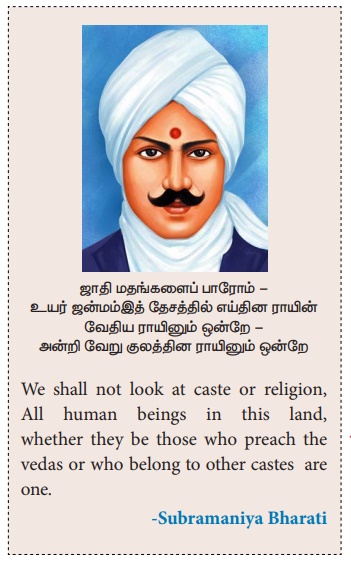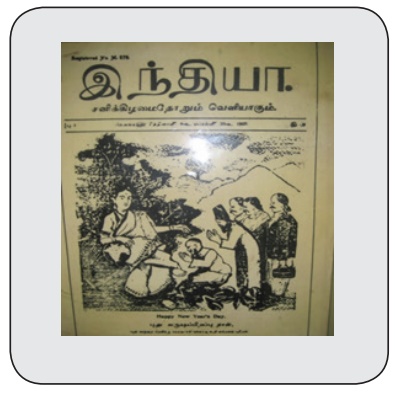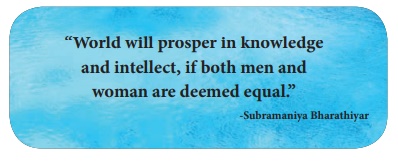Tamil Nadu Political Thought - Nationalism | 11th Political Science : Chapter 14 : Tamil Nadu Political Thought
Chapter: 11th Political Science : Chapter 14 : Tamil Nadu Political Thought
Nationalism
Nationalism
Subramaniya Bharathiyar (1882 – 1921)

C. Subramaniya Bharathiyar was a poet, freedom
fighter and social reformer from Tamil Nadu. He was known as Mahakavi
Bharathiyar and the laudatory epithet Mahakavi means a great poet. He is
considered as one of India’s greatest poets. His songs on nationalism and
freedom of India helped to rally the masses to support the Indian Independence
Movement in Tamil Nadu.
Bharathi: A poet and a Nationalist

Significantly, a new age in Tamil literature began
with Subramaniya Bharathi. Most part of his compositions are classifiable as
short lyrical outpourings on patriotic, devotional and mystic themes. Bharathi
was essentially a lyrical poet. “Kannan
Pattu” “Nilavum Vanminum Katrum”
“Panchali Sabatam” “Kuyil Pattu” are examples of Bharathi’s great poetic output.
Bharathi is considered as a national poet due to
his number of poems of the patriotic flavour through which he exhorted the
people to join the independence struggle and work vigorously for the liberation
of the country. Instead of merely being proud of his country he also outlined
his vision for a free India. He published the sensational “Sudesa Geethangal” in 1908.
Bharathi as a Journalist
Many years of Bharathi’s life were spent in the
field of journalism, Bharathi, as a young man began his career as a journalist
and as a sub-editor in “Swadesamitran”
in November 1904.“India” saw the
light of the day in May, 1906. It declared as its motto the three slogans of
the French Revolution, Liberty, Equality and Fraternity. It blazed a new trail
in Tamil Journalism. In order to proclaim its revolutionary ardour, Bharathi
had the weekly printed in red paper. “India”
was the first paper in Tamil Nadu to publish political cartoons. He also edited
and published 'Vijaya', a Tamil daily “Bala Bharatha” an English monthly, and
'Suryothayam' a local weekly of Pondicherry.
It is not surprising therefore that soon a warrant
was waiting at the door of the “India” office
for the arrest of the editor of the magazine.
It was because of this worsening situation in 1908 that Bharathi decided to go
away to Pondicherry, a French territory at that time, and continue to publish
the “India” magazine. Bharathi
resided in Pondicherry for sometime to escape the wrath of the British
imperialists.

During his exile, Bharathi had the opportunity to
mingle with many leaders of the militant wing of the independence movement such
as Aurobindo, Lajpat Rai and V.V.Subramaniam who had also sought asylum in the
French ruled Pondicherry. The most profitable years of Bharathi’s life were the
ten years he spent in Pondicherry. From Pondicherry, he guided the Tamil youth
of Madras to tread in the path of nationalism. This increased the anger of the
British towards Bharathi’s writings as they felt that it was his writings that
induce and influence the patriotic spirit of the Tamil youth. Bharathi met
Mahatma Gandhi in 1919 in Rajaji’s home at Madras. Bharathi entered British
India near Cuddalore in November 1918 and was promptly arrested. Even in
prison, he spent his time in writing poems on freedom, nationalism and
country’s welfare.
In his early days of youth he had good relations
with Nationalist Tamil Leaders like V.O.Chidambaram, Subramanya Siva, Mandayam
Thirumalachariar and Srinivasachari. Along with these leaders he used to
discuss the problems facing the country due to British rule. Bharathi used to
attend the Annual sessions of Indian National Congress and discuss national
issues with extremist Indian National Leaders like Bipin Chandra Pal, B.G.
Tilak and V.V.Subramaniam. His participation and activities in Benaras Session
(1905) and Surat Session (1907) of the Indian National Congress impressed many
national leaders about his patriotic fervour. Bharathi had maintained good
relations with some of the national leaders and shared his thoughts and views
on the nation and offered his suggestions to strengthen the nationalist
movement. Undoubtedly, his wise suggestions and steadfast support to the cause
of nationalism rejuvenated many national leaders. Thus Bharathi played a
pivotal role in the freedom of India.
Bharathiyar as a social reformer
Bharathi was also against caste system. He declared
that there were only two castes-men and women and nothing more than that. Above
all, he himself had removed his sacred thread. He had also adorned many
scheduled caste people with sacred thread. He used to take tea sold in shops
run by Muslims. He along with his family members attended church on all
festival occasions. He advocated temple entry of Dalits. For all his reforms,
he had to face opposition from his neighbours. But Bharathi was very clear that
unless Indians unite as children of Mother India, they could not achieve
freedom. He believed in women’s rights, gender equality and women emancipation.
He opposed child marriage, dowry system and supported widow remarriage.

Bharathiyar – A Visionary
Bharathi as a poet, journalist, freedom fighter and
social reformer had made a great impact not only on the Tamil society but also
on the entire human society. He followed what all he preached and it is here
that his greatness is manifested. His prophecy during the colonial period about
the independence of India came true after two and half decades after his
demise. His vision about a glorious India has been taking a shape in the
post-Independence era. Bharathi did not live for himself but for the people and
nation. That is why he is respectfully called as Bharathiyar. Even today, after
many decades, Subramaniya Bharathiyar stands as an undying symbol of Indian
freedom and vibrant Tamil nationalism.
Related Topics